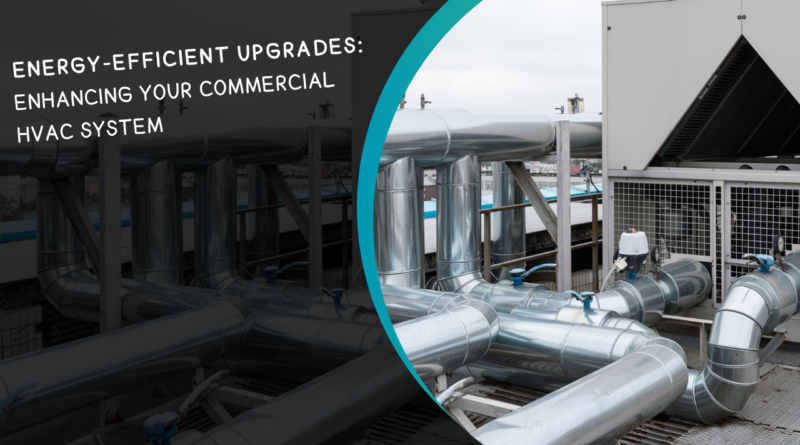Energy-efficient Upgrades: Enhancing Your Commercial HVAC System
Upgrading commercial premises involves more than just aesthetics and technology—it also involves sustainability and efficiency. Among the myriad upgrades one can think of, tweaking the heating, ventilation, and air conditioning (HVAC) system for better energy efficiency is a game-changer. Given that HVAC systems are often the biggest energy consumers in a commercial building, focusing on them can lead to significant savings and environmental benefits. So, if you’re looking to make your property greener and more cost-effective, you’ll want to read more about these transformative upgrades.
Understanding HVAC systems and energy efficiency
The relationship between HVAC systems and a building’s energy performance is profound. Originally designed for climate control and comfort, these systems can, unfortunately, be huge energy hogs if not properly optimized. Energy efficiency in this context means utilizing less energy to provide the same service. For instance, a modern, energy-efficient HVAC system can maintain your building’s temperature just as effectively as an older, less efficient model, but it’ll use significantly less energy to do so. The principle here is simple: do more with less. This not only cuts down on your utility bills but also reduces your carbon footprint, aligning your operations with broader environmental goals.
An HVAC system’s efficiency can drastically fluctuate depending on the age of the system, its design, and the quality of its installation and maintenance. Systems that are over a decade old, for example, typically operate far less efficiently than more modern units. With technological advancements in recent years, today’s HVAC systems often include features that prioritize energy efficiency, from multi-stage compressors to variable-speed fans. Implementing these contemporary solutions can lead to more precise temperature control, reduced energy peaks, and overall improved system longevity, further boosting your building’s energy optimization efforts.
The benefits of upgrading your system
Upgrading your HVAC system has several advantages over just financial ones. First off, these improvements can raise the market worth of your property considerably. Prospective tenants and buyers who are more concerned about energy expenses and the environment will find properties with contemporary, efficient systems more appealing.
Second, a modern HVAC system may significantly enhance indoor air quality and comfort, guaranteeing inhabitants a more comfortable and healthy atmosphere. In the end, these enhancements show a dedication to sustainability, which is a quality that is highly prized in the market today.
The possibility for increased system reliability and long-term cost savings on maintenance is another strong argument in favor of replacing your old HVAC system with an energy-efficient one. Advanced diagnostics included in contemporary HVAC systems help better anticipate and prevent equipment breakdowns.
By addressing problems before they result in expensive downtimes, predictive maintenance ensures that business activities continue unhindered. Commercial organizations that primarily depend on regulated environments, such as data centers, hospitals, and manufacturing plants, where system failures can have serious consequences, must take these factors into account.
Key upgrades to consider for your HVAC system
When it comes to updating for efficiency, where do you begin? An ideal place to start is with a smart thermostat. With the ability to automatically adjust heating and cooling based on current occupancy and weather conditions, these devices offer previously unheard-of control over these systems. Next, think about investing in energy-efficient HVAC systems that offer reduced usage while maintaining performance.
Finally, consider installing a zoned HVAC system. By enabling you to independently regulate the temperature in various parts of your property, these systems help you avoid wasting energy in empty regions.
Also, investigate the newest advancements in HVAC automation technologies while thinking about system improvements. Through the integration of HVAC system controls with other building services, building automation systems (BAS) elevate energy optimization to a new degree of sophistication. A comprehensive approach to energy management is made possible by this connectivity, enabling access, security, and lighting systems to cooperate with HVAC services.
A BAS’s intelligence guarantees the most effective operation of all linked systems, optimizing energy savings and giving administrators easy-to-use interfaces through which they can monitor and change settings as necessary.
Incorporating renewable energy
Renewable energy sources are reshaping how we think about powering HVAC systems. Solar power, with its vast potential for energy generation, can be harnessed to operate HVAC systems, significantly reducing reliance on traditional, non-renewable energy sources.
Geothermal energy is another exciting avenue, utilizing the stable temperatures below the Earth’s surface to heat and cool buildings in an incredibly efficient manner. While the initial investment might be higher, the long-term savings and environmental benefits are substantial.
Maintenance tips for optimizing performance
Upgrading your HVAC system involves more than just adding new features; it also entails performing routine maintenance to maximize efficiency. Efficiency can be greatly increased by performing simple tasks like routinely servicing and cleaning your system, changing the filters, and making sure the ducts are clear of obstructions. By taking these precautions, you can ensure that your HVAC system runs as efficiently as possible and prolong its lifespan, which will lower your energy expenses and consumption even more.
Financial incentives and rebates
Thankfully, recognizing the benefits of energy-efficient upgrades, many government entities and organizations offer financial incentives and rebate programs. These can help mitigate the upfront costs associated with purchasing and installing more efficient HVAC systems.
Depending on your location, you might find a variety of tax credits, rebates, and grants designed to encourage energy conservation. It’s worth investing time to research and apply for these incentives, as they can substantially lower the financial barrier to greener, more efficient operations.
Where to start with your upgrade
The journey to a more energy-efficient HVAC system begins with an assessment of your current setup. Understanding the performance and efficiency of your existing system is crucial in pinpointing areas for improvement.
Engaging with HVAC professionals can provide a roadmap for your upgrades, tailored to your building’s unique needs and budget. Prioritizing these updates not only aligns with financial sensibilities but also paves the way for a more sustainable and profitable future.
Finally, the drive for energy efficiency in commercial HVAC systems is about more than just keeping up with the latest fashions; it’s about taking responsibility for the environment and improving the functionality and marketability of your building.
The path to a more sustainable, effective business is complex and includes regular maintenance, technology advancements, and—possibly most importantly—a mental adjustment. By being proactive now, we create the conditions for a more affluent and environmentally friendly tomorrow.
Also Read:




